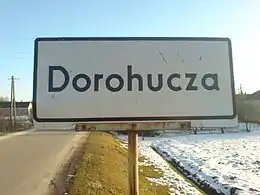Dorohucza
Dorohucza [dɔrɔˈxut͡ʂa] is a village in the administrative district of Gmina Trawniki, within Świdnik County, Lublin Voivodeship, in eastern Poland. It lies approximately 23 kilometres (14 mi) east of Świdnik and 33 km (21 mi) east of the regional capital Lublin.[1] The village has a population of 753.
Dorohucza | |
|---|---|
Village | |
 Church of Saint Jude Thaddeus the Apostle in Dorohucza | |
 Dorohucza | |
| Coordinates: 51°10′N 23°1′E | |
| Country | |
| Voivodeship | Lublin |
| County | Świdnik |
| Gmina | Trawniki |
| Population | |
| • Total | 753 |
World War II
During the occupation of Poland by Nazi Germany in World War II Dorohucza was the location of a forced labor camp of the Lublin Reservation complex. According to historian Jules Schelvis, at least 700 Dutch Jews were imprisoned there building latifundia of Generalplan Ost for the German settlers. They were transferred to Dorohucza directly upon arrival in Sobibór extermination camp. The Dorohucza camp was located just east of the village, 5 kilometres (3.1 mi) from the Trawniki concentration camp, used as training base for the Trawniki men from Reichskommissariat Ukraine. The camp was liquidated at the start of Aktion Erntefest of 3 November 1943.[2]

References
- "Central Statistical Office (GUS) - TERYT (National Register of Territorial Land Apportionment Journal)" (in Polish). 2008-06-01.
- Sobiborinterviews.nl. "Jules Schelvis (Amsterdam, 7 January 1921 – 3 April 2016, Amstelveen)". Netherlands Institute for War Documentation (NIOD). Dutch Jews who survived Sobibor.